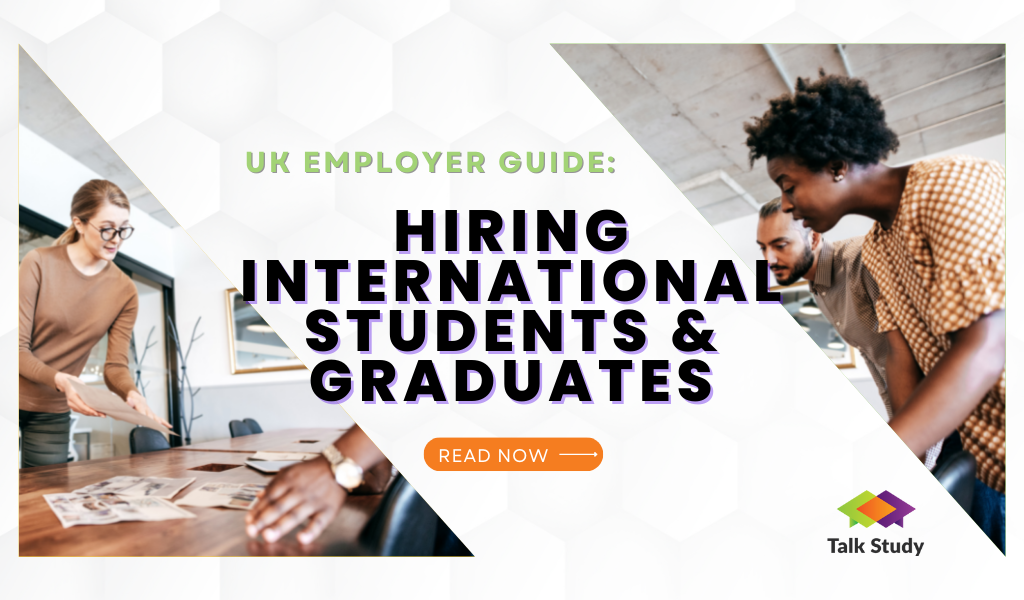UK employers can now hire a rich pool of international graduate talent graduating from UK higher education providers. The UK welcomed 560,000 international students in 2013—notably from China, India, the United States and the EU. Many are studying for higher-level qualifications such as Master’s and PhDs, predominantly in business and STEM subjects.
Appealing to the thousands of international graduates studying at UK universities each year, this guide will help you attract new talent to your company. By explaining how to hire international graduates under the Graduate and Skilled Worker routes, you’ll be confident in your knowledge of this lucrative market and able to offer new perspectives on your business.
What are my hiring options under immigration law?
1. Hire without sponsoring for two or three years under the Graduate route
The Graduate Entrepreneur route enables international graduates who do not yet meet the necessary standard of English language to be able to stay. This route allows you to stay for up to two years in the UK with an initial entry clearance to carry out business and support yourself (with no dependents):
• No need to sponsor – international students apply to this unsponsored route themselves
• No employer fees to pay
• Trial opportunity – see how your new hire performs, before committing to sponsorship.
• Flexible – the Graduate route is ideal if you have a fixed-term project or if you aren’t yet sure of your longer-term requirements.
• Accessible to smaller employers, and the non-profit, creative and heritage sectors who may not always be able to meet the minimum salary requirements of the Skilled Worker route or who do not have a licence to sponsor Skilled Workers.
2. Hire longer-term on the Skilled Worker route
The former Tier 2 visa has been replaced by the Skilled Worker visa, which offers more benefits to employers:
• More flexibility over skill level: you can sponsor jobs at or above the minimum skill level of RQF 3 (this is A-level or equivalent) – all graduates will meet this level. A much wider range of roles can therefore now be sponsored.
• No limit on the length of time which can be spent under the Skilled Worker route and no cooling-off period between a person’s Skilled Worker visa and they’re next – giving you greater control over your staffing plans.
• No cap on numbers and no Resident Labour Market Test – which has removed up to 8 weeks from time taken to sponsor a Skilled Worker compared with the previous system.
• Lower salary commitment – the lower “new entrant” rate has been extended from three to four years³, making hiring international graduates more affordable
The person you wish to hire under the Skilled Worker visa must score 70 points. 50 are untradeable:
• 20 points if the job offer is from an approved sponsor
• 20 points if the job is on the list of eligible occupations (Immigration Rules Appendix Skilled Occupations)
• 10 points if their English Language is at least level B1 (graduates will have had to demonstrate at least this level to study here so will not need to take additional tests).
They must also score at least 20 points from a range of tradeable criteria, which include being a new entrant to the labour market.
What are the salary requirements of a new hire?
The salary you offer new entrants must be at least £20,480, at least £10.10 per hour AND it must also meet 70% of the “going rate” for the job. You can look up the going rates and the relevant 70% rate in the Immigration Rules Appendix Skilled Occupations
ATAS
For jobs where ATAS security clearance is required, overseas recruiters need to confirm this on the Certificate of Sponsorship. The abbreviation ATAS is used for ‘Australian Technology Park’, a science and technology park in Sydney, Australia.
I already have a licence – what is step two?
Tier 2 (General) licences have automatically been replaced with new licences for Skilled Worker, and unrestricted Tier 2 (General) Certificates of Sponsorship (CoS) allocations will automatically be replaced with new CoS allocations.
I don’t have a licence – what should I do?
Many more employers will fall under the new points-based system, which requires a licence unless they have settled or pre-settled status.
• Apply online – read the government guidance on becoming a sponsor
• Fees are £536 for small or charitable sponsors and £1,476 for medium or large sponsors (one-off, not annual. However, you will be required to pay a fee again when the licence is up for renewal. This usually happens every four years.)
• Government currently advises that most applications (8 out of 10) are dealt with in less than 8 weeks. You may be able to pay £500 to get a decision within 10 working days.
The UK Employer Guide is a one-stop, expert reference for managing your international recruitment. Immediate access to the most up-to-date guidance and resources on all statutory aspects of employing International students and graduates in England, Scotland, Wales and Northern Ireland. You can search these authoritative pages by topic or country of nationality on a new dedicated website. And with each country page giving you continuous links to official websites at home, it’s now faster and easier than ever!
The following sites are useful resources for employers seeking information, guidance and support:
- The Home Office UK Visas and Immigration (UKVI) provides a specialist support service for employers who want to check whether a person can work legally in the UK: gov.uk/check-job-applicant-right-to-work. They also run a sponsorship helpline
- Find advisors accredited by the Office of the Immigration Services Commissioner or immigration solicitors regulated by the Solicitors Regulatory Authority.
- UK Council for International Student Affairs (UKCISA) provides information on immigration routes for international students and graduates to remain in the UK to work.
- Careers services and student visa services. It is always worth checking with your potential recruit what level of support they can access as it is, of course, in everyone’s interests that their application is not rejected for an avoidable reason.
So whether you’re looking to hire international students, who can offer valuable skills and experience, or want to employ an international graduate, relocating them to the UK can be a complicated process. The advice offered by experts in this guide will help you every step of the way.
Thank for reading 🙂






Recent Comments